Search Results for 'Peter Daly'
31 results found.
Druid 2020 - Chekhov and a Galway tour of Irish plays
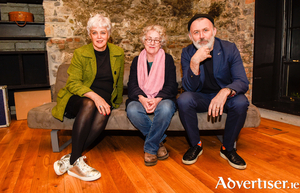
CHEKHOV'S MASTERPIECE The Cherry Orchard, and a tour of Galway as part of the 2020 Capital of Culture events, featuring one-act plays by Lady Gregory and Seán O’Casey, make up Druid's programme of events for next year.
The Lynch window
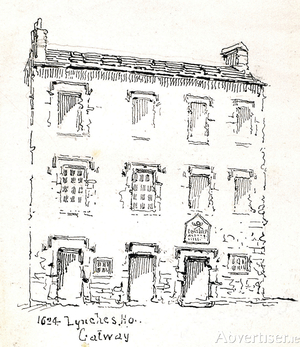
In 1807, the Reverend Edward Mangin wrote a three-volume romantic novel entitled George the Third in which he headed one of the chapters “Which would not have appeared had it not been written”. In it he invented a story about the Mayor of Galway, James Lynch Fitzstephen, hanging his son. Thirteen years later James Hardiman published his History of Galway in which he slightly changed, and greatly elaborated on, the story. This gave Mangin’s story a much wider audience, especially in this country, and so the legend became history. It was copied by many writers over the last 200 years, books written, plays written, films made, etc.
Mount St Mary’s
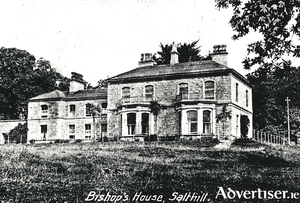
In the late 12th century, the Diocese of Annaghdown came into existence in the area surrounding the city of Galway. In 1324 it was united with Tuam, but the Anglo-Norman families refused to accept direction from Tuam. In 1484 Pope Innocent VIII made St Nicholas’ Church a Collegiate Church governed by a warden (not a bishop) and eight vicars. Edmund ffrench, the last warden, was made Bishop of Kilmacduagh in 1824. On April 27, 1831, the Bull ‘Sedium Episcopalaism’ was issued by Pope Gregory XVI erecting the Diocese of Galway. On October 23, 1831, the first Bishop of the Diocese, George Joseph Plunkett Browne, was consecrated, and in 1844 he was succeeded by Laurence O’Donnell. John McEvilly became Bishop in 1857.
Druid announces cast for Richard III

AARON MONAGHAN, Marie Mullen, Rory Nolan, and Seán McGinley will appear in Druid Theatre's highly anticipated production of William Shakespeare's Richard III in September.
One hundred and seventy five years of Mercy education in Galway

The Sisters of Mercy came to Galway on May 1 1840. They started, in extremely difficult circumstances, in Lombard Street with three postulants. The need for uncloistered sisters who would be free to go about the streets and visit the poor in home, hospital, and jail was very great at the time. They were out and about the day after their arrival. An epidemic of cholera had broken out and they helped to nurse the ill and alleviate distress. They quickly prospered to become “Reputedly the best institution that ever was in Galway”.
Australia offered some relief for Famine orphan girls
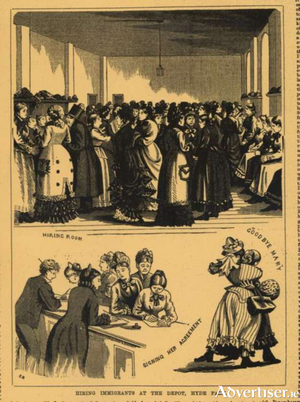
The extreme winter conditions of 1846/47 exacerbated the mounting crisis that the Great Famine had already created. The number of deaths from hunger in Galway town averaged between 25 and 30 a week. As well as the main workhouse on Newcastle Road (now the University College Hospital) auxiliary workhouses had opened at Barna, Newtownsmyth, Merchants Road, St Helen Street, and in Dangan. Six soup kitchens operated throughout the town feeding some 7,000 people a day and more as newcomers streamed in from rural districts. On one bitterly cold morning two children were found frozen to death on High Street. Another child dead nearby.
Fr Peter Daly - ‘The warmest expression of our unbounded gratitude.’
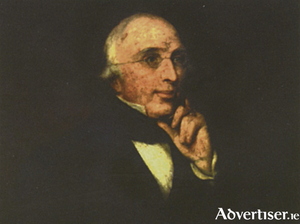
Described as a ‘turbulent priest’, and ‘the dominant public figure in Galway during the 1850s’, who was ‘a stubborn, abrasive, guileful and egotistical populist,’* Fr Peter Daly was the principle mover and shaker behind Galway’s drive to become the main transatlantic port for traffic to America in the 1850s. As chairman of both the Town Commissioners and the Harbour Board, he supported J O Lever’s Galway Line, which was to run three state-of-the-art steam-sailing ships between Galway and New York, from a grandiose harbour to be built off Furbo. Passengers from Britain, and all over Ireland, would be delivered to the terminal by train. It was to be the most comfortable, and shortest, route to America.
Did a midsummer murder silence a guilty pilot?
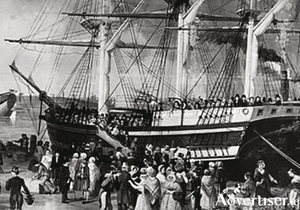
In June 1858 Galway town was in a fever of excitement. Its vision for a magnificent transatlantic port off Furbo, reaching deep into in Galway Bay, where passangers from Britain, and throughout the island of Ireland, would be brought to their emigration ship in the comfort of a train, could now be scuppered by the apparent carelessness of the two local pilots.
Swing into the Town Hall with Fishamble
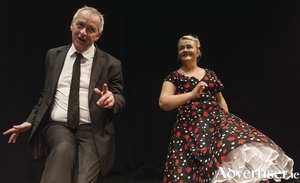
INTERNATIONAL HIT play, Swing, a beguiling comedy about dance, music and love hits the Town Hall Theatre on Friday April 1 at 8pm. Produced by Dublin’s Fishamble Theatre Co, it won the Bewley’s Little Gem Award at the 2013 Dublin Fringe Festival, and has been performed in New York, Paris, Edinburgh, and New Zealand, and is scheduled to go to Australia after its current Irish tour.
The young priest who cried for two days in Carna
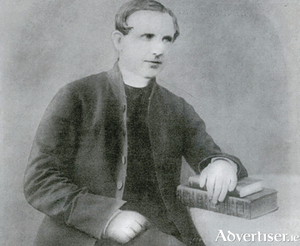
I hope the recent scandals in the Catholic Church will not discourage the noble tradition of the cleric as the social champion of the people. It is time that we had their like to nail their colours to the mast once again. Growing up in the last century, I was familiar with such names as Fr James McDyer and his tireless campaign against the official neglect of Gleann Cholm Cile; and Canon George Quinn and his fight for better social housing. There were several others, who have spilled over into recent years, including Fr Peter McVerry and his fight for homeless people in Dublin, and Fr Harry Bohan and his belief in the staying power of families in rural Ireland. But the champion of them all, the priest with the soft voice and a twinkle in both eyes, was the indefatigable Monsignor James Horan. Not only did he re-design the village of Knock to make it more people friendly, he built schools, clinics, and a convent, and a vast basilica. He organised community water schemes, and forestry plantations, and built an impressive international airport in the bogs of Mayo.

